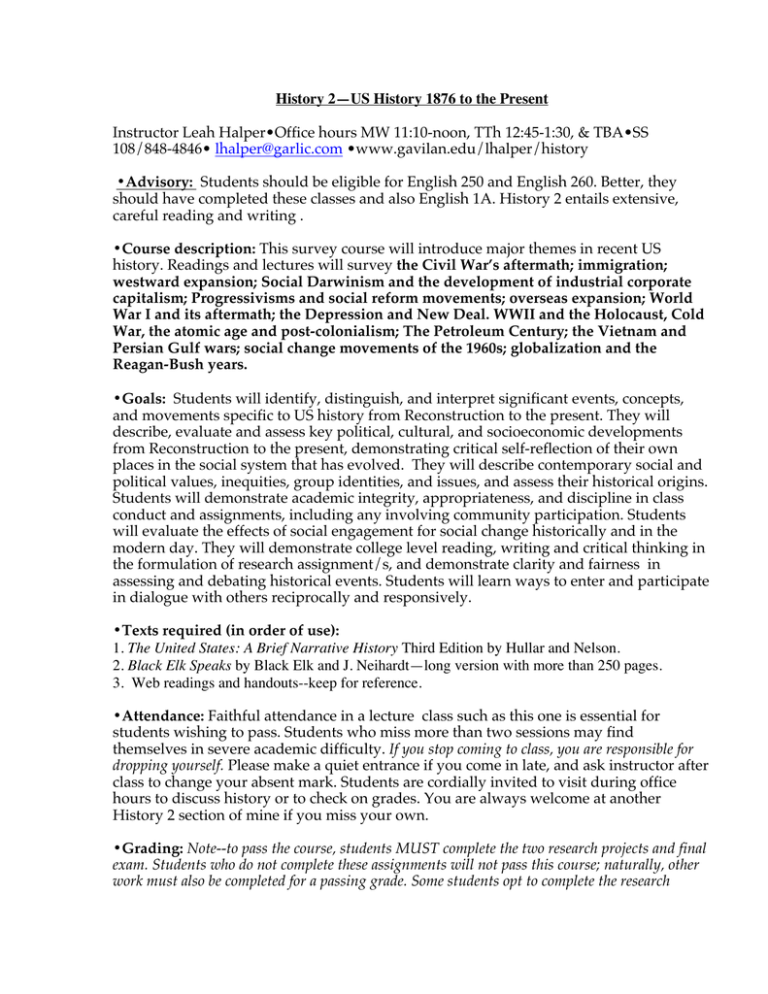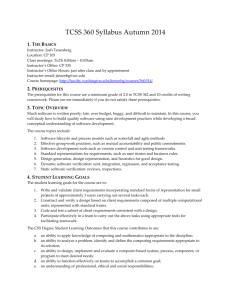History 2—US History 1876 to the Present 108/848-4846•
advertisement

History 2—US History 1876 to the Present Instructor Leah Halper•Office hours MW 11:10-noon, TTh 12:45-1:30, & TBA•SS 108/848-4846• lhalper@garlic.com •www.gavilan.edu/lhalper/history •Advisory: Students should be eligible for English 250 and English 260. Better, they should have completed these classes and also English 1A. History 2 entails extensive, careful reading and writing . •Course description: This survey course will introduce major themes in recent US history. Readings and lectures will survey the Civil War’s aftermath; immigration; westward expansion; Social Darwinism and the development of industrial corporate capitalism; Progressivisms and social reform movements; overseas expansion; World War I and its aftermath; the Depression and New Deal. WWII and the Holocaust, Cold War, the atomic age and post-colonialism; The Petroleum Century; the Vietnam and Persian Gulf wars; social change movements of the 1960s; globalization and the Reagan-Bush years. •Goals: Students will identify, distinguish, and interpret significant events, concepts, and movements specific to US history from Reconstruction to the present. They will describe, evaluate and assess key political, cultural, and socioeconomic developments from Reconstruction to the present, demonstrating critical self-reflection of their own places in the social system that has evolved. They will describe contemporary social and political values, inequities, group identities, and issues, and assess their historical origins. Students will demonstrate academic integrity, appropriateness, and discipline in class conduct and assignments, including any involving community participation. Students will evaluate the effects of social engagement for social change historically and in the modern day. They will demonstrate college level reading, writing and critical thinking in the formulation of research assignment/s, and demonstrate clarity and fairness in assessing and debating historical events. Students will learn ways to enter and participate in dialogue with others reciprocally and responsively. •Texts required (in order of use): 1. The United States: A Brief Narrative History Third Edition by Hullar and Nelson. 2. Black Elk Speaks by Black Elk and J. Neihardt—long version with more than 250 pages. 3. Web readings and handouts--keep for reference. •Attendance: Faithful attendance in a lecture class such as this one is essential for students wishing to pass. Students who miss more than two sessions may find themselves in severe academic difficulty. If you stop coming to class, you are responsible for dropping yourself. Please make a quiet entrance if you come in late, and ask instructor after class to change your absent mark. Students are cordially invited to visit during office hours to discuss history or to check on grades. You are always welcome at another History 2 section of mine if you miss your own. •Grading: Note--to pass the course, students MUST complete the two research projects and final exam. Students who do not complete these assignments will not pass this course; naturally, other work must also be completed for a passing grade. Some students opt to complete the research project late for no credit rather than losing credit for the whole course. •Course grades will be based upon concept checks (10 percent), homework assignments (30 percent), corporations research paper (10 percent), oral history research project (30 percent), class participation (10 percent) and a final exam (10 percent). •Plagiarism, a serious academic offense, is defined in this class as taking credit for any work, including exams, research, or homework, that is not your own, whether it is another student's or an author's. Academic dishonesty involves fabricating or otherwise misusing information. To uphold standards of integrity and to protect students who are doing original work, both academic dishonesty and plagiarism will be dealt with severely in this class. No student who has plagiarized can get anything but an F on the relevant assignment. Most students who fail to practice academic honesty find it difficult to pass the class. •I love meeting with you during my office hour to discuss your status in the class. It’s always wise to keep homework and concept checks together after I return them in case our records differ on what you’ve done, and so you can use them to study for tests and do research papers. Homework –Homework will involve reading (always), studying conceptual questions about the readings (always), practicing MLA format with portfolio assignments based on the reading (often) and practicing outlining skills with a series of skills videos (often) that will end up in a portfolio for grading. I grade written homework on an A-F scale. Homework may be turned in for less credit one week late, but no later unless there are unusual circumstances that we discuss one on one so I know and agree. Keep returned homework. Please note that homework will build important academic skills, and should be high priority. Concept checks--An important part of the class will consist of mini-quizzes testing your ability to analyze and apply historical information contained in the readings, frameworks, and lecture notes to concepts or current news. No one passes these without study. I will give you questions to study on the readings ahead of time; use them well! You usually will be able to work with as many as two others in class on these concept checks, so as to pool your knowledge. I grade based on the thoroughness and accuracy of your answers; questions will be short essay. Students in different classes are given different concept checks. Keep all returned concept checks for future reference. Try not to miss concept checks, as make-ups only work in the other section. Final exam—The exam will consist of essay questions, and may include some definitions and short-answer identifications. A study sheet will be provided before the test, and each test will have the weight of various questions indicated. Students will receive standard letter grades (90-A, 80=B, etc.); plusses and minuses are used. Final cannot be made up; early finals are not generally available. Tests are graded upon: thoroughness; use of evidence and examples; quality of thought about the questions posed/originality of insight; analysis of information using historical background knowledge; application of known materials to new frameworks; organization of material; relevance of response to the question. Students in different classes are given different tests. Class participation--I take the following questions into consideration: Do you participate in group activities? Do you take responsibility in groups to help advance discussion? Do you contribute post-it note questions for class discussion? Are you prepared for discussions? (Naturally, all of these are impossible when you are absent, so while you cannot be graded on your absences, they will affect this grade.) Have your followed standards of academic honesty? (If not, it may be very difficult for you to pass.) Corporate History project—You will be asked to choose a corporation active in US history for at least twenty years. For example, Monsanto or Pfister would do fine; Google would not work. I will help you with resources and information. Oral History research paper --Consider early in the course whether you have an older relative or friend who can talk about her or his life. If not, start looking for another helpful elder. You will complete research on two themes central to your subject’s life, and integrate that research into your paper. Papers will be graded upon quality of thought and use of history in questions, and use of standard MLA endnote format. If you do not know how to write a research paper, consult with instructor or library staff early on. Note: In order to discourage plagiarism and encourage sustainable work habits, I will not grade papers from students who have not met earlier deadlines. We will be using Turnitin.com for. Extra Credit. Although extra credit is offered and encouraged, students should focus first on homework and tests in order to pass the class. •Resources. Please use the least wasteful options whenever possible for this class—use scratch paper or double sides for written work, and share/return/recycle class materials you don’t need. •Course schedule by week of (subject to change--please keep up in class, and refer to the assignments area of the website, rather than this general guide, for the most reliable information on what’s due when): see grid. •Students requiring special services or arrangements because of hearing, visual or other disability should EARLY IN THE SEMESTER contact their instructor, counselor or the Disabled Student Services Office, 848-4741.Occupational/Vocational students--limited English language skills will not be a barrier to admittance to and participation in vocational education programs. •The Gavilan College Academic Honesty Policy is in effect in this class, and will be enforced. Students may not use any aids other than writing instruments during tests, or sanctions will be applied. Homework bearing your name should include your substantial contribution; do not take credit for work you did not do. •Learning occurs most productively in a safe, respectful environment. Differences of viewpoints, orientation, and experience are expected and welcomed in class discussions. If you don't feel safe or respected, though, I need to know! So please talk to me as soon as ANY problem comes up. Homework for Halper's History 2--first assignments A. Strengths and challenges. Due second day of class (week of Aug 25). Use the index card I give you to write about three strengths you have that will help you in this class, and three challenges you think you would like to work on while you're in here. These may be personality (I love challenges, or I am shy), academic (I write well, or I have trouble reading) habits (I work on homework six hours a night, or I procrastinate), circumstances (I'm unemployed so have lots of time, or I have a new baby who's up all night), or fears (I am afraid I will make other students look bad, or I've heard you fly in on a broom.) Then add THREE GOALS you have for yourself. Finally, consider honestly--what can I, your history teacher, do to help you with your challenges and goals? B. Snapshots, web work and speaking. Due: second day of class( week of August 25). Purposes: To prepare for class, help me get to know you a little, to establish a snapshot of where history has brought us, and to allow you to consider how you feel about the future, given the past. Requires: webwork, writing. Consider the World & US Snapshots. Select three bits of information and reproduce them so you bring them with you on paper to class (not electronically!) We will work with these on the second day of class. Note: no written response, just the selections themselves. C. Read Chapter 8 in your text. Study the Short Paragraphs work on p. 90. Due: the fourth day of class (second week of school). Know all the vocabulary on p. 89 for the first concept check. Do whatever writing/notetaking will help you retain the information for the concept check. D. Read The Jungle, immigration framework. Due: the fourth day of class (second week of school). Purposes: To introduce the plight of the immigrant in US history; to examine class heirarchies; to discuss the effects of marginalization. Requires: reading, using MLA citation style on five quotes that seem important to you from the work (one in each style from the handout), answering The Jungle study questions (found online) in whatever form (not to turn in) so you are prepared for the first concept check. Please prepare to read Black Elk Speaks Labor Day weekend.; start early if you are a slow reader or need time to absorb information; the whole book is assigned.




